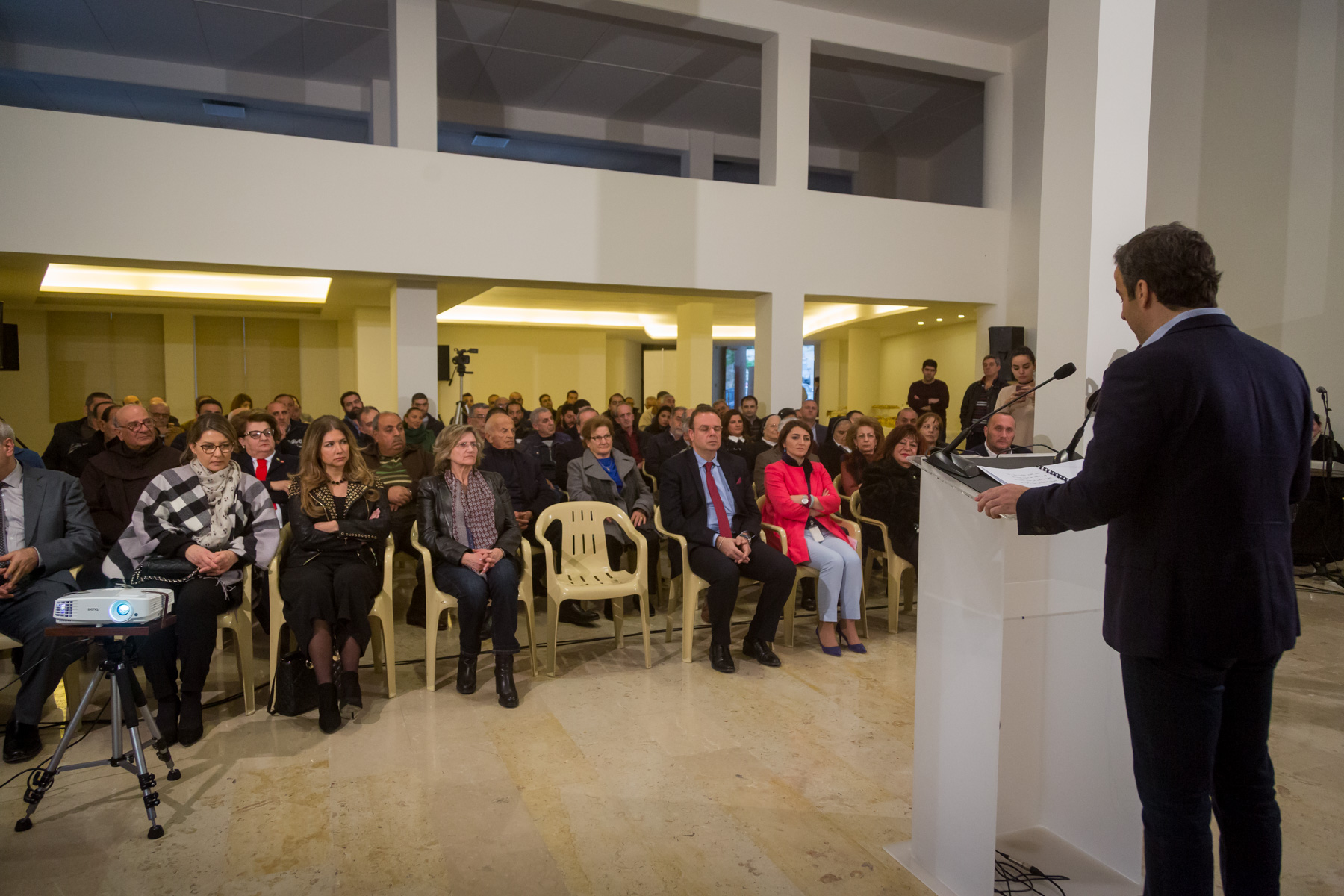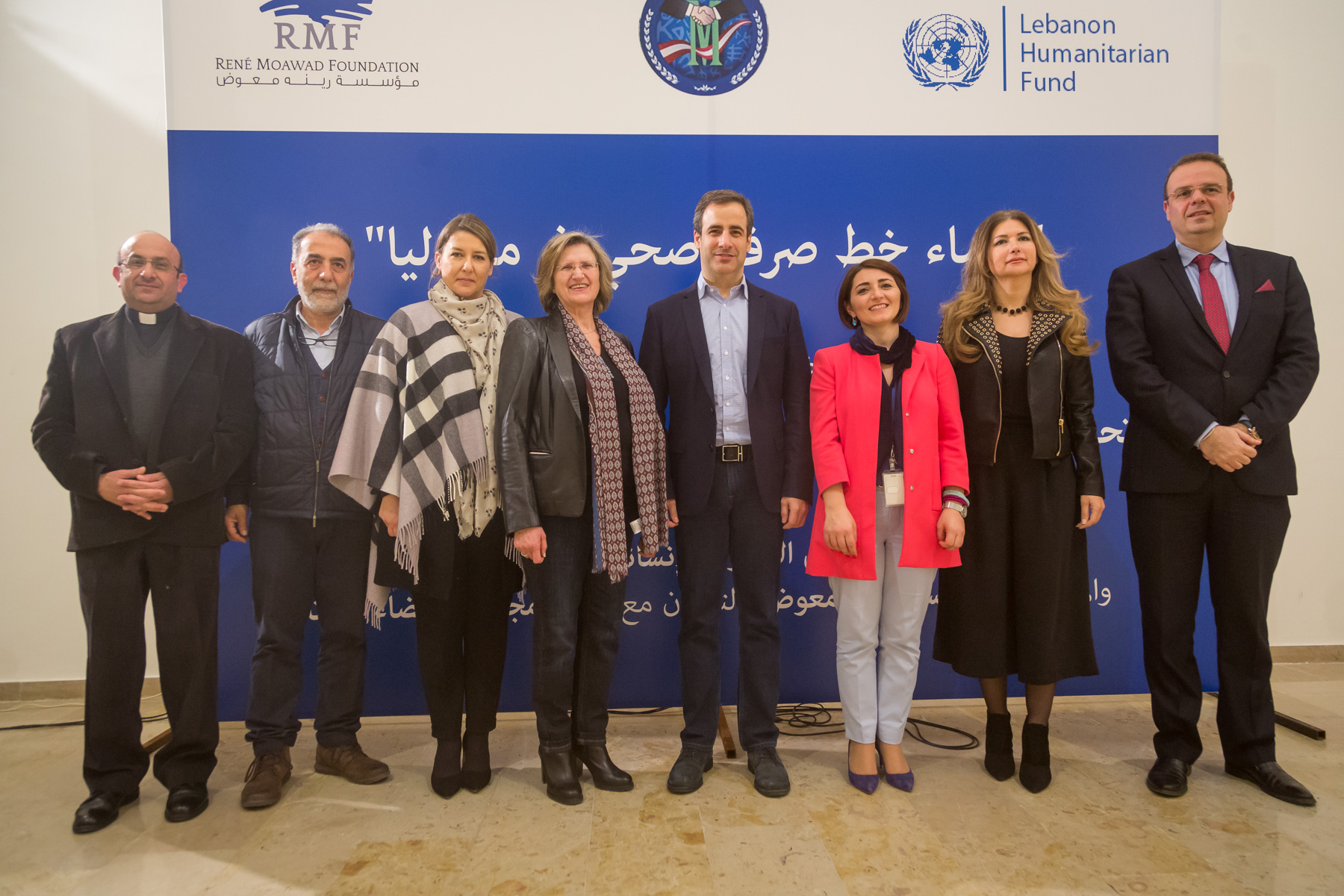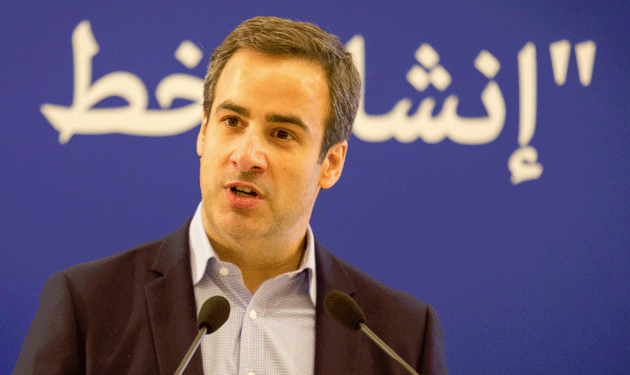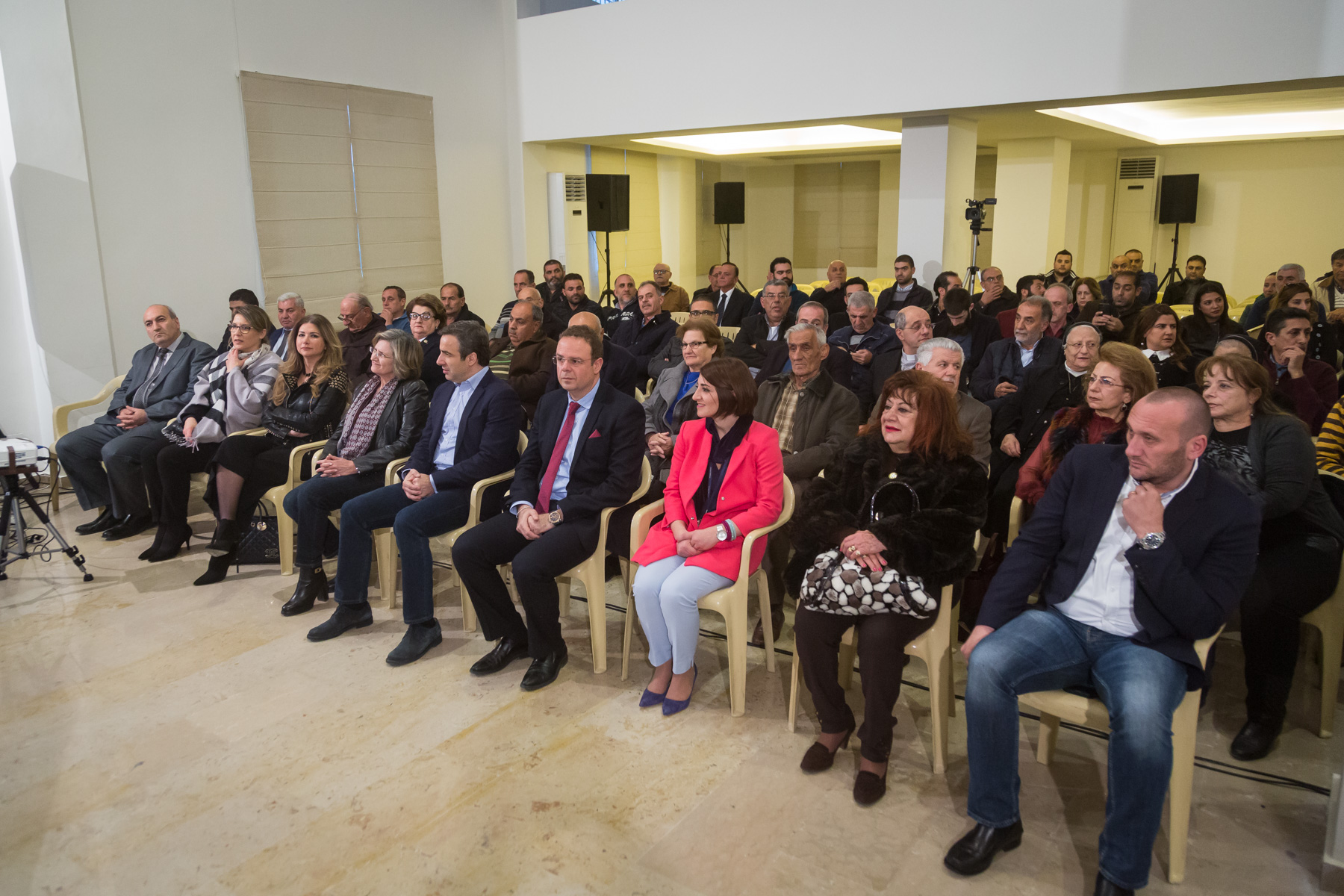RMF launches a project for establishing a sewage network in Mejdlaya, funded by the United Nation’s OCHA – Lebanon Humanitarian Fund
Moawad: The lack of development is caused by the inefficient centralized system in the country. The only solution to fix this problem is to adopt a decentralized system.
RMF’s Executive Director Michel Moawad pointed out that “taxes and fees paid by the citizens in all the countries of the world are allocated to provide services, to implement development projects in the regions, and to offer services and comforts for the citizens. This is happening in all the countries, except in Lebanon.”
Moawad emphasized that the reason behind the lack of development is our failed centralized system. He stated that there will be no real change in this and no real development happening without adopting a decentralized system, which would give the local authorities in the regions wider powers to plan for and implement the development projects needed in their areas; the municipalities and local authorities being the most qualified to understand the needs of their regions.
Moawad’s statements came at the inauguration of the “Establishing a sewage network ” project in Mejdlaya which was organized by the Mejdlaya Municipality and the Rene Moawad Foundation within the framework of the “Bringing adequate sanitation infrastructure in Zgharta and Mejdlaya” program, funded by the UN’s Office for the Coordination for Humanitarian Affairs – Lebanon Humanitarian Fund (OCHA LHF).
The ceremony took place in the new hall of the Our Lady church in Mejdlaya, and was attended by: The Minister of Energy and Water Cesar Abi Khalil represented by Mr. Tony Marouni; the director of the OCHA LHF fund Ms. Rawad Al Zeer; Mr. Tony Suleiman Frangiyeh represented by Mr. Shadi Dahdah; the Caemmakam of Zgharta Ms. Iman Rifai; the President of the Union of Municipalities of Zgharta Mr Zeenni Kheir; the president of the ‘Ajyal’ foundation Ms. Marianne Sarkis; the mayor of Mejdlaya Ms. Joumana Beani along with members of the municipal council; a number of moukhtars; representatives of institutions and of religious, social, educational and cultural associations; in addition of a crowd of local people.

Details of the project
The “Establishing a sewage network in Mejdlaya” project falls within the scope of the broader “Bringing adequate sanitation infrastructure in Zgharta and Mejdlaya ” program that aims to limit the situations of conflict between the Syrian refugees and the local communities hosting them, in matters related to sanitation and infrastructure, and to improve the capacities of the hosting municipalities through the funding of development projects that target infrastructure, sanitation, waste water and rain water.
The project came after a preliminary evaluation conducted by the RMF team, with the cooperation and in coordination with the Municipality of Mejdlaya. The study encompassed the various sectors in the town, and determined the priority needs. It revealed the urgent need to remove the damages and harm caused by the sewage water running down the streets and roads that connect Mejdlaya to Al Fawwar. The absence of a sewage network in the area (The Carmeliyya-Fawwar road) was the reason behind this, and the problem had worsened due to the influx of Syrian refugees.

The main activities of the project to be executed by RMF are:
– Setting up a 1260 meters long line of sewage.
– Linking the sewage network of part of the Al Fawwar town to the new line of sewage.
– Building sewage connections to the houses along the Carmeliyya-Al Fawwar road, which will benefit 2,800 Lebanese and 640 displaced Syrians. And by this, remove the harm that resulted from the emission of bad smells and environmental pollution, in an area with a high population density and which includes a private hospital and a care home for the elderly.
– The project will also include awareness sessions and the distribution of manuals on water, sanitation, hygiene and the resolution of conflicts, in addition to the distribution of hygiene kits to1,000 students in 9 targeted schools in Mejdlaya and Zgharta.
The Mayor Mejdlaya
The event started with the Lebanese National Anthem, followed by a speech by the Mayor of Mejdlaya Ms. Joumana Beani in which she thanked RMF’s Executive Director Michel Moawad and UNOCHA-LHF’s representative Ms. Rawad Zeer, hoping for a continued support and for more similar future initiatives.
Beani pointed out that a few years ago “Mejdlaya was a quiet and peaceful little village. It had a population of just a few thousands. But suddenly, it grew up to become a large town of about 30,000 citizens from various parts of Lebanon. Today, it is facing, like most of the Lebanese regions, the burden of hosting a huge number of Syrian refugees who live in houses, under tents or in warehouses.”
She explained that “With the limited resources and capacities that Mejdlaya has, 30,000 inhabitants is a huge figure. All of these people use the infrastructure of the town and its water, electricity and sanitation resources which are from the 1960ies when the population didn’t exceed a few hundreds. Mejdlaya cannot bear this growing pressure it is facing today. Due to the limited capacities, this huge increase in the population, along with the urban extension that Mejdlaya is witnessing, was not accompanied by the development of the town’s infrastructure and its resources.”
Moawad
RMF’s Executive Director Michel Moawad then spoke: “A few days ago, we were inaugurating together with OCHA LHF a project in Zgharta in collaboration with the Municipality of Zgharta. And here we are today, after a week, inaugurating with OCHA too, a very important project in Mejdlaya.”
Moawad thanked the United Nations “for its care to fund development projects in Lebanon. As, regardless of the reason behind this help, and I mean here the Syrian refugees element, our villages and cities are in a big need for such projects that benefit the Lebanese people, and also the displaced Syrians.”
“It is enough to mention that the project that we are launching today, which will be executed by RMF Mejdlaya with the cooperation of the Municipality and the funding by OCHA, will benefit 2800 Lebanese and 640 Syrian refugees. 9 schools from the area will also benefit from it.”
Moawad continued: “Mejdlaya is not anymore like it was just a few years ago. Mejdlaya has become today the link between Zgharta and Tripoli. It evolved from a little village to a large town where people from Zgharta, from the remote areas of the Zgharta Caza, from Tripoli and Dunnieyeh, from Akkar and Becharre and other regions are living. This urban and population evolution, to which is added the Syrian refugees factor, was not accompanied by appropriate planning and evolution at the level of infrastructure.”
“Just imagine that in this area, there were no sewage water pipes. In the neighbourhood where we are executing this project, waste water was running down the streets. The project that we are inaugurating today, will build a 1260 meters long sewage line and link the sewage network of a part of Al Fawwar to it. We are also building sewage connections to the houses along the Carmeliyya-Al Fawwar road, linking them to the line. This will benefit 2,800 Lebanese citizens in the area.”
Moawad emphasized that the project was an urgent need for the people of the area, even without the Syrian refugees’ added factor. He added: “It is not acceptable that in 2017 there are houses in our areas that are not linked to a sewage network. Unfortunately, this reality is the general rule, not an exception. You all know well how much this matter is affecting the environment and the health of the citizens in the area. I don’t need to tell you what it means to have sewage running down the streets… It simple means that it is entering our homes, polluting our environment, bringing sickness to us and our children. You all were suffering from this every single day. Let us remember that in the area we have a hospital, a school and a care home for the elderly. Just image the extent of harm and damage.”
He also pointed out that “the reason behind this situation is the lack of development due to our failed centralized system. In all the countries of the world, the taxes and fees paid by the citizens are allocated to provide services, to implement development projects in the regions, and to offer services and comforts for the citizens. This happens in all the countries, except in Lebanon.”
He added that “there will be no real change in this and no real development happening in Lebanon without adopting a large decentralized system which would give the local authorities in the regions wider powers to plan for and implement the development projects needed in their areas. The municipalities and local authorities are the most qualified to understand the needs of their regions.”
“While we wait for our system to be changed, and in the midst of these bitter times, we have to try our best to compensate through the cooperating between donors (today it is the United Nations), social organization (amongst which RMF holds a distinguished place) and local authorities (represented in this project by the Municipality of Mejdlaya). This triangle has managed to partially compensate the absence of the central government in these needed projects. We are trying to do our best, with our available means and the funding support of our donor.”
Moawad also said: “Just imagine: This project cost just around 100,000 USD, excluding the linking with the houses which was covered by the citizens under the supervision of the Municipality and the contractor. With this amount of money, we could solve a pressing problem for thousands of citizens. At the same time, we see tens and hundreds of millions of USD going waste at the central government due to corruption. This means that if there was less corruption, it would be possible to implement many useful projects and initiatives, benefitting the Lebanese citizens.”
Moawad concluded: “Allow me to repeat my thanks to the UN’s OCHA LHF that provided the funding for this project. I also thank the Municipality of Mejdlaya for its cooperation with us. And I, of course, cannot forget the RMF team which works on implementing the project in the allocated time and in the best way possible. Thank you for being with us, and we hope to be able to execute many more projects in the future.”
The event ended with a concluding reception.








 العربية
العربية